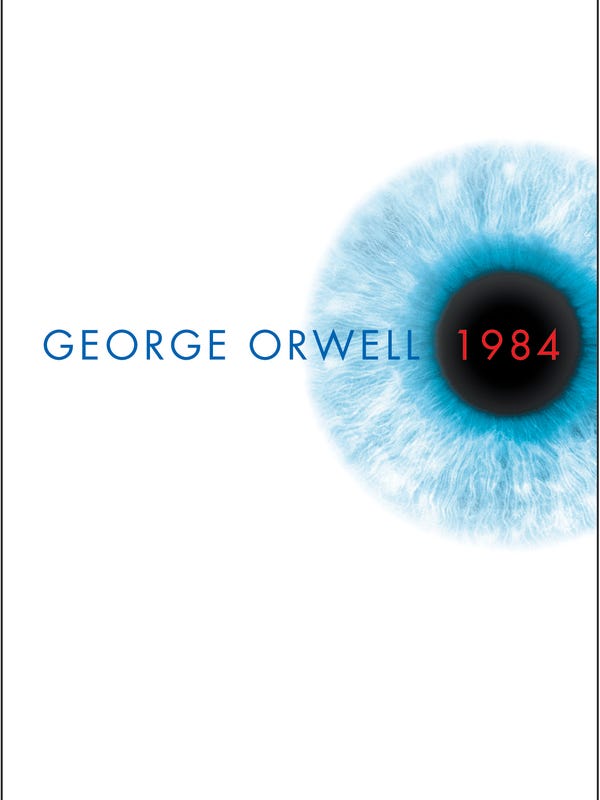What does "Orwellian" mean?
Library Champion,
One positive I have found in the political and social unrest we have faced in the past few years is the consistent release of books addressing those very issues. Activists who have risen to prominence through social media often write a book compiling their speeches. Politicians who are seeking office and want to make their name known outside of their state or area write a book. Critics of one side of politics write a book about the other side (and vice-versa). The best seller lists are often full of titles addressing current issues. These are all signs that while the world is troubled we turn to books to learn more.
What we say and write is interpreted by others and can often be taken out of context or used completely incorrectly. In the past week there has been a rise in the use of the phrase "Orwellian."** I am guilty of not reading any George Orwell books since high school and haven't retained the finer details of his books. But the past week is pushing me to re-read his books in light of their constant mentioning in the news and by public figures.

Donate to the library today! It takes less than a minute. Click here.
“1984” rose to the top of Amazon’s top-selling book list over the weekend. On Monday, it reached the No. 1 spot. Not bad for a book published in 1949.
The term “Orwellian” has become shorthand for exercises of authority with which one disagrees. When a publisher drops your book because your brand has become toxic, it’s Orwellian. When an internet platform enforces its terms of service and kicks you off, it’s Orwellian. When a store has you removed from the premises for refusing to wear a mask during a pandemic, it’s Orwellian.
“It tends to be a kind of catch-all for repression,” says David Ulin, associate professor of English at the University of Southern California and former book editor of the Los Angeles Times. He has read and studied Orwell’s works extensively, and he finds it's recent use not just inaccurate but ironic.

Donate to the library today! It takes less than a minute. Click here.
“There’s a real irony in the fact that someone who paid such attention to clarity in language – Orwell’s whole thing was about transparency in language, that language needed to be absolutely clear like a pane of glass – that a writer like that becomes a rhetorical tool for the people who would have been at the point of his lance,” Ulin says.
“It’s actually almost counter-Orwellian,” says Pallavi Yetur, a practicing psychotherapist with a master's degree in creative writing whose critical thesis was on Orwell and how his life experiences formed the way he thought about government.
“Every line of serious work that I have written since 1936 has been written, directly or indirectly, against totalitarianism and for democratic socialism, as I understand it,” Orwell wrote in his 1946 essay handily titled “Why I Write.” That was the year Orwell joined a leftist militia to fight in the Spanish Civil War against fascist Francisco Franco’s military uprising in Spain.
Eric Arthur Blair (Orwell was his pen name) was born to British civil servants in India, a member of what he called the “lower-upper-middle class.” A deeply moral thinker and writer, Orwell didn’t sit comfortably in his privilege but was a committed democratic socialist, described by some to be “along the lines of a Bernie Sanders."

Donate to the library today! It takes less than a minute. Click here.
So when war broke out in Spain, Orwell saw it as his moral duty to kill some fascists. “When I joined the militia I had promised myself to kill one Fascist – after all, if each of us killed one they would soon be extinct,” Orwell wrote. He was shot in the throat by a fascist sniper and nearly died.
His experience in the Spanish Civil War also wised Orwell up to the failures of Soviet communism, whose tactics of oppression and obfuscation mirrored those of the fascists the communists were fighting despite existing on opposite ends of the political spectrum. The opposing ideologies were two sides of the same totalitarian coin, each flavor of undemocratic authoritarian control intolerable to Orwell. “He was very wary of totalitarianism from the left as well as from the right,” Ulin says.
Orwell’s experience in the Spanish Civil War crystallized his politics, which formed the literary fabric of everything he would write thereafter.
“1984” is often reduced to its base components, the catchphrases and slogans of the fictional government in Orwell’s dystopian allegory for Soviet totalitarianism. The takeaway is often: Oppression bad, liberty good.
But Orwell’s book is much more sophisticated. Orwell was interested not just in communicating the badness of totalitarian regimes but also dissecting how they succeed through the manipulation of language.
“'Orwellian,’ in the most orthodox way, is about language as a means of control,” Yetur says. “A Nazi propagandist like Leni Riefenstahl, that would be very Orwellian, because that’s somebody who’s using words to invoke feelings, to invoke allegiances, to discredit enemies."
“Orwellian” is not just applicable to the fascists and communists of Orwell’s era, though. Things like the dissemination of false information and the use of information to obfuscate rather than illuminate are recurring themes in today's world.
One could also see shades of “1984” in social media. In the book, Orwell invents “Two Minutes Hate,” a daily event in which video of the enemy is publicly screened and the audience is encouraged to stir itself up into a froth of rage. When used in a certain way, social media can work on people’s most negative and virulent emotions and using that as a way to control them but also to make them feel as if they are being heard.
Donate to the library today! It takes less than a minute. Click here.
“1984” and “Animal Farm” are Orwell’s greatest hits and certainly worth revisiting (or reading for the first time; I won't judge). But Orwell was also a prolific essayist, literary critic, journalist and columnist, and much of his best work is in his less flashy nonfiction. If you want to expand your understanding of Orwell and better appreciate the philosophy of one of our most enduring modern political writers, these works are good starting points.
• “Homage to Catalonia”: Published in 1938, this personal account of Orwell’s experiences fighting in the Spanish Civil War is essential to understanding every work that followed. “If you had asked me why I had joined the militia I should have answered: ‘To Fight against Fascism,’” Orwell wrote, “and if you had asked me what I was fighting for, I should have answered: ‘Common decency.’”
• “Down and Out in Paris and London”: Orwell lived in purposeful poverty for a time in Paris and London, two of the world’s wealthiest cities, and wrote about his experiences in this 1933 memoir. He made the choice to go to Paris and London and work low-end jobs and live that life, to immerse in it, because that’s where his sympathies were.
• “Politics and the English Language”: This 1946 essay is a short and essential read on the importance of clarity of language. It was central to both Orwell’s writing and politics, because he saw the two inextricably linked. Corrupt language, Orwell wrote, can also corrupt thought. “Political language – and with variations this is true of all political parties, from Conservatives to Anarchists – is designed to make lies sound truthful and murder respectable, and to give an appearance of solidity to pure wind.”
Whenever you hear an author or book thrown out there, I recommend reading up on it.
Donate to the library today! It takes less than a minute. Click here.

Here is one book I am reading and a book that I just bought for the library's collection.
I am reading Before She Disappeared by Lisa Gardner
(Adult fiction, mystery)
It’s been a while since Gardner (When You See Me) wrote a stand-alone; this one is well worth the wait. You will fall in love with her protagonist, Frankie Elkin, a recovering alcoholic lost soul who keeps sober by running from her past and roaming from city to city seeking cold-case missing people that law enforcement has given up on. After 14 cases, she’s hoping to finally rescue her first living victim, Angelique Badeau, a local Haitian high school girl who went missing without a trace several months ago. As Frankie works this puzzling case, readers will have to pay close attention to the subtle carrots Gardner dangles in front of them. It’s a wild ride through Boston’s Mattapan neighborhood; a mix of real and imagined dangerous streets where her local characters perfectly reflect the rich mix of island cultures there.
Bottom line: Fans of this incredible author, police procedurals, timely immigrant stories, strong determined women, and tales that are not tied up with a pretty bow at the end will not be able to get enough of this intense page-turner.
Donate to the library today! It takes less than a minute. Click here.
One of the books I purchased that you should check out: The Doctors Blackwell: How Two Pioneering Sisters Brought Medicine to Women and Women to Medicine by Janice P. Nimura (Adult nonfiction)

In this follow-up to Daughters of the Samurai (2015), Nimura chronicles the lives and work of Elizabeth (1821-1910) and Emily (1826-1910) Blackwell, America’s first and third women to earn medical degrees (MD), deftly weaving together a dramatic true story that reads like a work of historical fiction.
Bright and determined, the sisters received their hard-won medical degrees a few years apart. Even though she found bodily functions “disgusting,” Elizabeth was a pioneer in the genderless pursuit of common good through education; Emily held an aligned ideology, but she became more concerned with practical medical application.
Maintaining narrative momentum, Nimura packs the text with evocative, memorable vignettes—e.g., the sisters aweing entire lecture halls into stunned silence or eruptions of applause with their wit and courage, battling life-threatening illnesses, or enjoying encounters with a variety of historical figures. As different as they were alike, both sisters met seemingly insurmountable obstacles with inspiring displays of fortitude.
Refreshingly, the author does not portray these women as one-dimensional figures of women’s suffrage, which they resolutely were not. Instead, she describes how both sisters often viewed women without admiration or sisterly affection. For example, she highlights how Elizabeth’s “own sympathies lay, to a surprising extent, with the men who were nonplussed by her presence at medical school” rather than the women she treated.
Peppered with appearances from Abraham Lincoln, Florence Nightingale, Susan B. Anthony, and others, the text is a vibrant landscape that affirms the prominent place of the Blackwell sisters in medical history. Illustrating how they created and activated rich networks of supporters and sympathizers, both men and women, throughout their professional pursuits, Nimura is careful never to embellish one sister’s character at the expense of the other. As she clearly demonstrates, each possessed characteristic strengths and weaknesses.
Bottom line: A riveting dual biography of America’s first female physicians, a compellingly portrayed and vividly realized biography of triumph and trailblazing.
Donate to the library today! It takes less than a minute. Click here.
Did you know? Lists of our new releases are available in-person at the library and online so that you never miss a new release.

Is your library card current? If not, click here to see. It's one of the most powerful things you can have.
Your support ensures that a library card is incredibly valuable and remains free.
For the littles: Our Weekly Winter Schedule

We offer weekly videos, crafts, and other ideas. Check out the group here: https://www.facebook.com/groups/553960618564183
You can make a donation to the library in under 2 minutes. Click here to do just that.
--
Your library misses you. We wish you and your family health and wellbeing during these (and all) times.
--Vince Giordano
Librarian and Director of the Juniata County Library.
P.S.- You don't need to make an account or jump through any hoops to be a library champion. I wouldn't say this if it wasn't true. You can make this happen in less than a minute. Just click here.